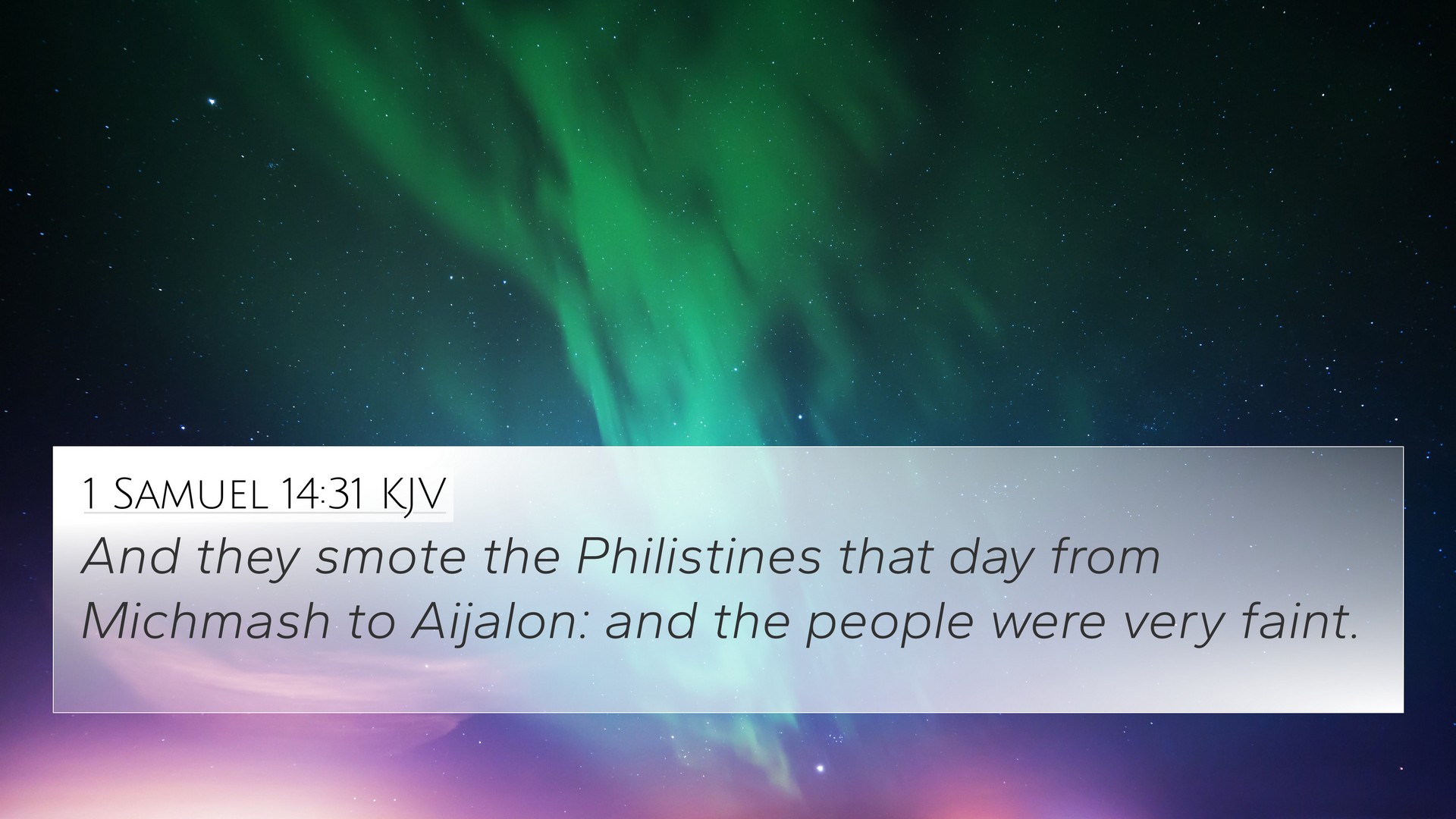Understanding 1 Samuel 14:31
1 Samuel 14:31 states, "And they smote the Philistines that day from Michmash to Aijalon: and the people were very faint." This verse encapsulates a critical moment during the reign of Saul, where the Israelites achieved a significant military victory but also faced the consequences of their battle fatigue. Below is a detailed analysis of this verse brought together from public domain commentaries, including insights from Matthew Henry, Albert Barnes, and Adam Clarke.
Contextual Overview
The events leading to this moment are pivotal. Saul had just made an impulsive oath during the battle, restricting his troops from eating. Consequently, the warriors became weak and faint, highlighting the consequences of hasty decisions made by leaders. The account serves as a lesson on the importance of wise leadership and the welfare of those under one's command.
Interpretative Insights
-
Matthew Henry's Commentary:
Henry emphasizes that while the victory is commendable, the anguish and faintness of the people reveal the negative impact of Saul's rash vow. He interprets this as a reminder of how a leader's choices can burden their followers and that spiritual nourishment, in the form of God's blessings, is crucial during trials.
-
Albert Barnes' Notes:
Barnes focuses on the geographical context, noting the route of the conquest from Michmash to Aijalon. He highlights the significance of the Philistines as persistent enemies and the relief brought to Israel by this victory. Barnes suggests that despite their success, the Israelites were morally compromised due to Saul's unwise command, which led them to suffer unnecessarily.
-
Adam Clarke's Commentary:
Clarke discusses the physical and spiritual ramifications of the battle. He notes that the “faintness” signifies not just physical exhaustion but also a metaphorical depletion felt by those who are under spiritual strains. This notion aligns with the broader theme of Israel's struggle for identity and purpose amid conflicts and challenges.
Bible Cross-References
To gain a deeper understanding of 1 Samuel 14:31, we can refer to several other scriptures that relate to its themes:
- Judges 20:21: Reflects on Israel's continual struggles against the Philistines, showcasing the enduring conflict.
- 1 Samuel 10:5: Highlights Saul's anointing and the divine purpose he was called to fulfill, contrasting the decisions he makes in battle.
- 1 Samuel 28:20: Reveals the spiritual crisis Saul experienced after making misguided choices.
- Proverbs 12:15: Offers wisdom on the importance of listening to counsel—a theme reflective of Saul's leadership failure.
- Isaiah 40:29: Provides reassurance of God’s strength for the weary, which connects to the physical and spiritual fatigue of Saul's men.
- 2 Corinthians 12:10: Discusses strength in weakness, a significant point for those who feel faint, such as Saul’s troops.
- Galatians 6:9: Encourages perseverance, linking to the need for endurance in battles, both physical and spiritual.
Thematic Connections
The themes in 1 Samuel 14:31 extend to various scriptural implications, including:
-
Leadership and Responsibility:
Saul's choices serve as a cautionary tale for leaders at all levels about the weight that their decisions carry.
-
Spiritual Nourishment:
The need for God's provision is emphasized, as the people were physically hungry after the battle—a metaphor for spiritual hunger.
-
Struggle and Victory:
The juxtaposition of victory amid faintness reflects the complex nature of spiritual warfare faced by believers.
Application for Today
Readers can apply the lessons from this verse to contemporary life by understanding the importance of wise leadership, the need for nurturing those in your care, and the spiritual implications of rash decisions. The historical account found in 1 Samuel serves as a valuable framework for assessing our own actions and their impact on the community, especially in times of 'battle'—whether social, spiritual, or emotional.
Conclusion
1 Samuel 14:31 presents a multidimensional reflection on leadership, the consequences of decisions, and the physical and spiritual states of those led. By exploring cross-references and connecting themes, we gain a holistic understanding of the verse's implications not only in its original context but also in our personal and communal lives today.
Further Study Aids
For those who wish to explore Bible verses related to 1 Samuel 14:31 in detail:
- Bible Concordance: Use this tool to find related verses that discuss leadership and decision-making.
- Bible Cross-Reference Guide: This resource can help identify thematic connections across different scripture passages.
- Bible Chain References: Utilize this method for understanding the flow of biblical narratives and their interconnected themes.




